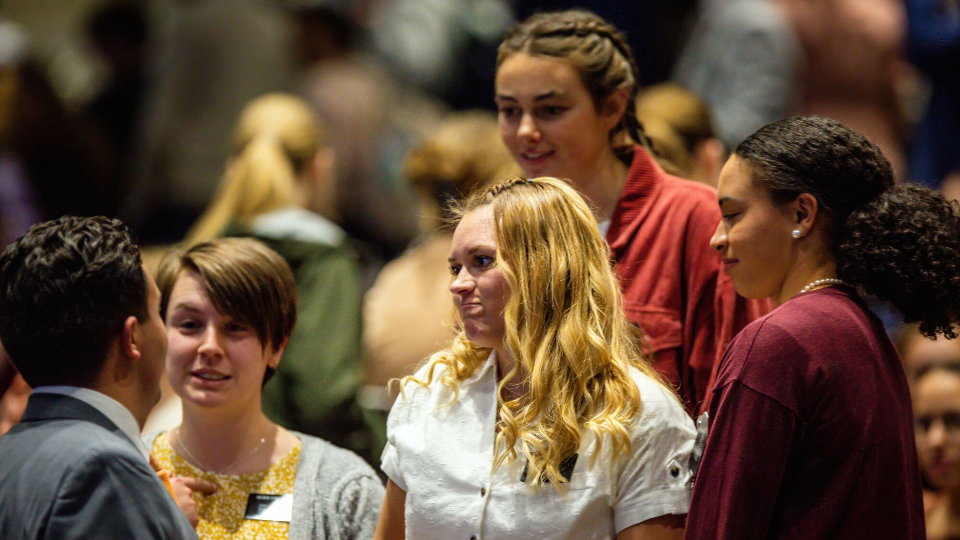
1-Women-Serving-Missions
Sister missionaries smile after meeting with President Russell M. Nelson of The Church of Jesus Christ of Latter-day Saints in Lima, Peru, on October 20, 2018. A new study found that female Latter-day Saint students at BYU who take gap time to serve missions were more likely to be accepted into limited-enrollment programs and find majors with higher expected salaries. Photo by Jeffrey D. Allred, courtesy of Church News. Copyright 2023 Deseret News Publishing Company.
This story appears here courtesy of TheChurchNews.com. It is not for use by other media.
By Mary Richards, Church News
As Shelby Clark from Richfield, Utah, was serving a full-time mission — first in Wichita, Kansas, and then on the island of Malta as part of the Italy Rome Mission — she said she realized both her divine and professional potential.
“A mission gave me the time and experiences to better understand what kind of life I wanted to live and what kind of person I wanted to become,” said Clark, who is now a junior at Brigham Young University studying Public Relations. “I feel that I was blessed with eternal perspective on my mission that helped me see through some of my previous confusion.”
While Clark was serving, she said, she had the opportunity to recognize and develop some of her spiritual gifts and wanted to apply them to a future career.
“Once I returned home, I had a better connection with my Savior and the Holy Ghost to guide me in all of the small details that lead to choosing a major: specific classes, teachers and opportunities,” she said.
Her experience fits with the findings of a new BYU study on the benefits of missionary service for women. The study found that female Latter-day Saint students at BYU who took time to serve missions came back to college and majored in fields with higher earnings potential compared to women who did not serve missions.
BYU School of Family Life professor Jocelyn Wikle and librarian Maggie Marchant looked at student data for more than 17,000 female BYU students who enrolled before the 2012 missionary-age policy change, and tracked their progress through 2020. During this period, 29.1% of the female students served a mission.
The study found that women who served missions were 33% more likely to change into a major with higher earning potential than women who didn’t serve. And, women who had lower ACT scores who served missions were then 19% more likely to be accepted into competitive or limited-enrollment programs.
The full research brief is available online through the Utah Women and Leadership Project.

2-Women-Serving-Missions
A woman studies the scriptures on the campus of Brigham Young University in Provo, Utah. A new study found that female Latter-day Saint students at BYU who take gap time to serve missions were more likely to be accepted into limited-enrollment programs and find majors with higher expected salaries. Photo by Nate Edwards, BYU. All rights reserved.
Benefits of a Mission for Women
Wikle told the Church News she and her co-author had seen anecdotal evidence that missions were impacting women in college, and wanted to investigate further. Their goal was to provide people with information on benefits and drawbacks of missionary service to support women in making decisions about missionary service that are right for them.
Wikle explained why she believed women who served missions were more likely to be accepted into limited-enrollment programs and find majors with higher expected salaries.
“Missionaries themselves often say they develop talents and skills that help them once they return to school, including interpersonal communication, grit, problem solving and independence,” Wikle said. “I suspect that increased maturity and personal awareness gained while on a mission may contribute to shifts in majors following a mission experience.”
She was encouraged by the particular benefit the study found among women who struggled academically and didn’t do well on standardized tests. Women who served missions were more likely to get accepted into competitive programs compared to women who did not serve missions.
“I was therefore encouraged to see that missions are in fact a way that these women could set themselves apart in competitive situations. For women who might struggle academically, I encourage them to find other channels like missions, internships, work experience, or study abroad to set themselves apart,” Wikle said.
Clara Cullen, from Provo, Utah, switched majors after serving a mission in Frankfurt, Germany.
She said leaving school to serve full time allowed her to increase in maturity and personal awareness as she served people from various cultures.
Now she is a senior studying political science and will graduate in April. Because of her testimony of the two great commandments — loving God and loving one’s neighbor — she hopes to use the skills she’s developed to help make the world a better place.
“I had always been interested in human behavior and what causes people to make decisions, but it wasn’t until my mission where I got to serve people different than me, in a country that had different politics than mine, that helped me think about how I could use my passion and skills to make an impact on people,” Cullen said in the BYU release.
Costs of Taking Time Away From School

3-Women-Serving-Missions
Missionaries talk before Sister J. Anette Dennis, first counselor in the Relief Society general presidency, speaks during a devotional at the missionary training center in Provo, Utah, on Tuesday, November 15, 2022. Photo by Adam Fondren, courtesy of Church News. All rights reserved.
Wikle said women should be mindful of other aspects of serving a mission as they make decisions. Missions do delay a woman’s progress toward graduating from college. While 96% of female missionaries returned to college after serving a mission, they were 10% less likely to graduate within eight years of starting college than their peers who didn’t take time away.
She is not sure why it is happening, but she said returned missionaries seem to be disproportionately leaving BYU two to three years after returning from a mission. That means some female returned missionaries leave college as juniors and seniors when they are likely approaching graduation, she said.
“I encourage anyone considering taking time away from school to be aware of how gap time slows progress toward graduation,” Wikle said. “Proactively making plans about how to get back into school and make progress toward graduation will help students to have meaningful experiences away from college without sacrificing their degree.”
Clark said finding and being accepted in the public relations program was a process of prayer and revelation for her, but her mission experience gave her a good head start.
“I am still in the journey of figuring out what I want to do for my career, but I am trusting in the testimony I built on my mission and experiences I have had afterward to move one step forward at a time,” she said.
Most importantly, Clark believes Jesus Christ cares for her now just as deeply as He did when she was a full-time missionary.
“Choosing a major and a future career are important to Him because they are important to me. He is still guiding my path so that I can become a better disciple.”
Copyright 2023 Deseret News Publishing Company.